Summary Overview
Beverage Cans Australia Market Overview
The Australian beverage cans market is growing steadily, driven by increasing demand for environmentally friendly and efficient packaging solutions. With a strong emphasis on sustainability, the beverage can industry is seeing a rise in demand for aluminum cans, known for their recyclability and durability. As consumer preferences shift toward sustainable packaging, beverage cans are becoming a more popular choice for companies aiming to reduce their environmental footprint. This report offers an in-depth analysis of procurement trends, highlighting opportunities for cost optimization and enhanced supply chain efficiency. It also addresses the challenges of rising production costs and supply chain disruptions, emphasizing the role of strategic sourcing and digital procurement tools in improving forecasting and managing risks.
The outlook for the beverage cans market in Australia is positive, with key trends and projections indicating robust growth through 2032:
-
Market Size: The Australian beverage cans market is projected to reach USD XX million by 2024, with an estimated compound annual growth rate (CAGR) of approximately 3.09% from 2024 to 2032
Growth Rate: 3.09%
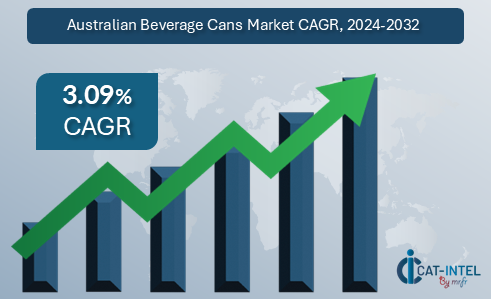
Sector Contributions:
The growth in the Australian beverage cans market is largely driven by:
-
Beverage Industry: The increasing consumer preference for canned beverages, particularly soft drinks, beer, and non-alcoholic drinks, is elevating demand for cans. -
Sustainability Focus: Aluminum cans are favoured due to their recyclability, driving both consumer and industry interest in reducing packaging waste.
Technological Transformation and Innovations:
- Advances in canning technologies and improvements in the efficiency of aluminum production are enhancing the sustainability of beverage cans. Manufacturers are also exploring innovative designs and eco-friendly materials to meet consumer demand for greener packaging solutions.
Funding Initiatives:
- Investment in sustainable manufacturing practices and recycling technology is boosting the demand for aluminum beverage cans. Initiatives to promote closed-loop recycling are particularly important in ensuring long-term supply chain sustainability.
Regional Insights:
- While Australia is the dominant player in its own market, the export demand for Australian beverage cans is increasing, driven by the need for sustainable packaging in regions like Asia and Europe. Local manufacturers are focusing on enhancing production efficiency to cater to both domestic and international markets.
Key Trends and Sustainability Outlook:
-
Sustainability Initiatives: As part of the global shift towards sustainability, Australian manufacturers are increasingly adopting water-efficient processes and expanding their use of recycled materials in the production of beverage cans. -
Health Trends: Growing demand for healthier, non-alcoholic, and functional beverages is spurring increased demand for beverage cans as an effective packaging solution. -
E-Commerce Growth: The expansion of e-commerce platforms is increasing the availability of canned beverages, particularly in the grocery segment, which further drives market growth.
Growth Drivers:
-
Environmental Benefits: The demand for recyclable and eco-friendly packaging solutions is one of the key drivers of growth in the Australian beverage cans market. -
Consumer Preferences: Increasing consumer focus on sustainability and convenience continues to push the popularity of aluminum cans. -
Export Opportunities: The growing international demand for Australian products, particularly in Asia-Pacific regions, is opening lucrative export opportunities for beverage can manufacturers. -
Technological Advancements: The implementation of smart manufacturing processes and digital tools in procurement is enhancing supply chain management and optimizing production efficiency.
Overview of Market Intelligence Services for the Beverage Cans Australia Market
Recent market analysis indicates that the Australian beverage cans industry is facing challenges related to fluctuating raw material costs and supply chain disruptions. Market intelligence reports offer valuable insights into these trends, providing detailed forecasts and procurement strategies that help stakeholders manage these challenges. By leveraging these insights, beverage manufacturers and buyers can optimize purchasing decisions, mitigate cost volatility, and improve operational efficiencies. Strategic sourcing and procurement management are essential to securing quality products at competitive prices, ensuring a competitive edge in the market.
Procurement Intelligence for Beverage Cans Australia Market: Category Management and Strategic Sourcing
"In the Australian beverage cans market, companies are refining procurement strategies to optimize supply chain efficiency, leveraging spend analysis solutions for vendor performance insights, and utilizing supply market intelligence to secure cost-effective sourcing options. Category management and strategic sourcing are becoming crucial in maintaining a steady supply of high-quality aluminum cans, ensuring competitive pricing and meeting the increasing demand for eco-friendly packaging solutions in the beverage industry."

Pricing Outlook for Beverage Cans Australia Market: Spend Analysis
The Australian beverage cans market is navigating a pricing environment marked by several key challenges and dynamics, including fluctuating production costs, increasing demand, and supply chain disruptions. Companies in this space are leveraging spend analysis tools to optimize procurement decisions, mitigate price volatility, and ensure a stable supply of high-quality aluminum cans.
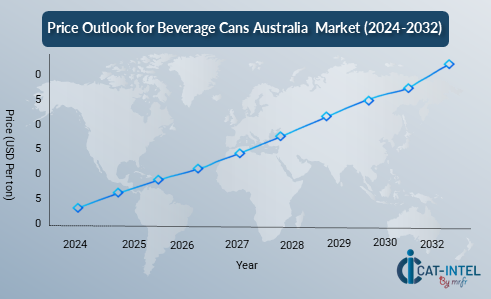
line chart illustrating the pricing outlook for the Beverage Cans market in Australia from 2024 to 2032.
Our analysis indicates a complex pricing outlook for the beverage cans market, influenced by several factors:
-
Rising Production Costs: The cost of aluminum, energy, and labour is rising due to supply chain pressures, particularly in the wake of global supply disruptions. This is driving up the overall cost of manufacturing beverage cans in Australia. -
Demand Surge: The growing consumption of canned beverages, fuelled by the increasing popularity of sparkling waters, energy drinks, and alcoholic beverages, is contributing to heightened demand for beverage cans. This demand growth is pushing up prices as manufacturers strive to meet market needs. -
Supply Chain Challenges: The ongoing global supply chain disruptions are affecting the timely delivery of raw materials, leading to higher transportation and logistics costs. Additionally, the limited availability of aluminum and other key inputs has created volatility in pricing, requiring companies to adjust procurement strategies frequently. -
Environmental Factors: The Australian market is under pressure to meet sustainability targets, with increased focus on the recycling of beverage cans and more sustainable manufacturing practices. These sustainability initiatives may lead to higher upfront costs, which could influence long-term pricing trends. -
Exchange Rates and Export Markets: As aluminum prices are largely influenced by global trade dynamics, fluctuations in the Australian dollar and growing demand from international markets, particularly in Asia and Europe, contribute to pricing volatility. Export opportunities also present competitive pricing pressures that may affect local market rates.
Cost Breakdown for the Beverage Cans Market in Australia: Cost-Saving Opportunities
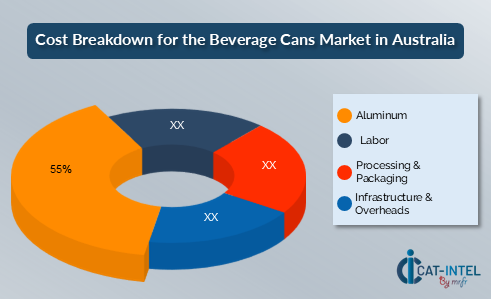
- Aluminum (55%)
-
Description: The cost of raw aluminum represents a major component of the beverage cans production cost. It includes the price of primary aluminum and aluminum alloys used in manufacturing cans. -
Trends: Prices for aluminum have seen fluctuations driven by global supply-demand dynamics, particularly from major producing countries like China. As of 2024, prices are expected to remain volatile due to energy costs, production cuts, and international trade policies impacting raw material costs.
- Labor (XX%)
- Processing & Packaging (XX%)
- Infrastructure & Overheads (XX%)
Cost saving opportunity: Negotiation Lever and Purchasing Negotiation Strategies
In the Australian beverage cans market, cost-saving opportunities lie in strategic procurement practices. Companies can negotiate bulk purchases and long-term contracts for favorable pricing, while adopting sustainable manufacturing practices like using recycled aluminum and energy-efficient processes to cut raw material and utility costs. Automation in production and logistics optimization also enhance efficiency, reducing labor and freight expenses. Consolidating suppliers and collaborating with industry associations can further drive cost reductions, ensuring profitability and competitiveness in this dynamic market.
Supply and Demand Overview of the Beverage Cans Australia Market: Demand-Supply Dynamics and Buyer Intelligence for Effective Supplier Relationship Management (SRM)
The beverage cans market in Australia is experiencing steady growth, driven by increasing demand for canned beverages, a shift toward sustainable packaging, and rising environmental concerns. Demand is particularly strong from the beverage, retail, and foodservice sectors, as consumer preferences for convenience and eco-friendly solutions continue to rise.
Demand Factors:
-
Health Consciousness: Growing health awareness drives the demand for non-alcoholic and functional beverages, which are often packaged in cans, including energy drinks, sparkling waters, and juices. -
Sustainability Trends: Increasing consumer preference for environmentally friendly packaging solutions is boosting the demand for aluminum cans, as they are 100% recyclable. -
Convenience and Portability: Consumers continue to favor convenient, on-the-go beverage options, increasing the demand for canned beverages across various retail channels. -
Innovative Beverage Offerings: The rise of craft beverages, including artisanal sodas, beer, and specialty drinks, also propels the demand for beverage cans in Australia.
Supply Factors:
-
Aluminum Supply: Australia imports most of its aluminum for can production, meaning supply is influenced by global aluminum prices and availability. Any disruptions in the global supply chain can impact the local market. -
Sustainability Initiatives: Australian manufacturers are increasingly focusing on sustainable production practices, such as reducing the carbon footprint of can manufacturing and increasing the use of recycled aluminum. -
Technological Advancements: Automation in the can production process, along with improved manufacturing efficiency, helps meet the rising demand while maintaining quality standards. -
Market Competition: Competition among beverage can producers and suppliers in Australia is increasing, driving continuous improvements in production efficiency and influencing pricing strategies.
Regional Demand-Supply Outlook: Beverage Cans Australia Market
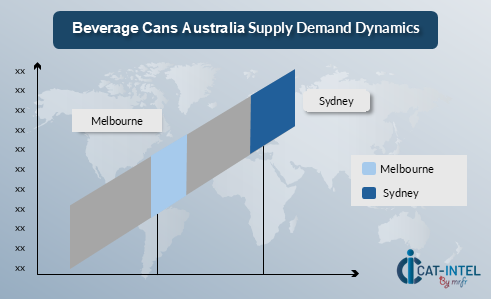
The image shows growing demand for Beverage Cans in both Sydney and Melbourne, with potential price increases and increased competition
The beverage cans market in Australia is growing steadily, driven by increased demand for sustainable packaging solutions and the rising popularity of canned beverages. Here’s a regional outlook for the market:
Australia: A Key Player in the Beverage Can Market Australia plays a significant role in the beverage cans market, characterized by:
-
Local Production: Australia produces a significant amount of beverage cans locally, particularly aluminum cans, supporting the country’s beverage sector. Local manufacturers focus on high-quality, cost-effective can production for beverages like soft drinks, beer, and sparkling water. -
Sustainability Initiatives: Australia is increasingly adopting sustainable practices in can manufacturing, focusing on improving recycling rates and reducing the carbon footprint of production. The demand for aluminum cans, due to their 100% recyclability, is growing among eco-conscious consumers. -
Strong Domestic Market: The local demand for canned beverages, including craft beers, energy drinks, and non-alcoholic options, is a driving force. The popularity of convenience products and on-the-go beverages supports growth in the beverage can market. -
Export Market: While Australia is not as large an exporter of beverage cans as some other regions, there is growing interest in exports to Asia and Oceania. Increasing global demand for sustainably packaged products presents opportunities for Australian manufacturers. -
Consumer Trends: Rising health awareness, the shift towards functional beverages, and the growing demand for convenient, portable beverage packaging are fuelling the demand for beverage cans in Australia.
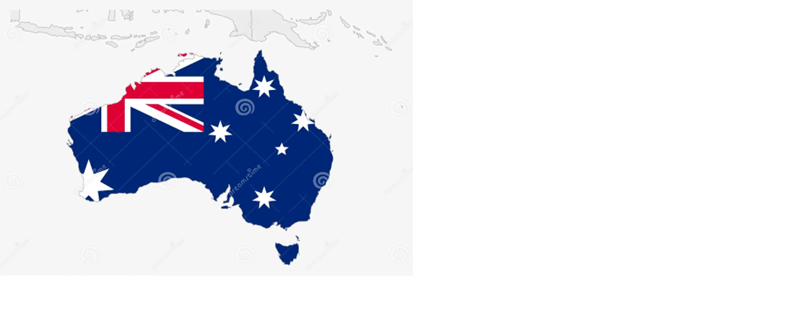 Beverage can and its innovation and growth
Beverage can and its innovation and growthSupplier Landscape: Supplier Negotiations and Strategies - Beverage Cans Australia Market
The beverage cans market in Australia has a robust and diversified supplier landscape, consisting of both local and international players. These suppliers provide the essential raw materials, equipment, and services necessary for beverage can production and distribution. Key suppliers include those providing aluminum, coatings, packaging materials, and canning equipment, all contributing to the market's overall efficiency and sustainability.
Supplier relationships in the beverage cans market are essential for securing high-quality raw materials and ensuring smooth production processes. Strategic supplier negotiations and collaborations help beverage can manufacturers meet increasing demand for sustainable packaging and stay competitive in a fast-evolving market.
Some of the key suppliers in the Beverage Cans Australia market include:
- Amcor Limited
- Ball Corporation
- Crown Holdings
- Novelis Inc.
- Alcoa Corporation
- Sealed Air Corporation
- BASF
- Tetra Pak
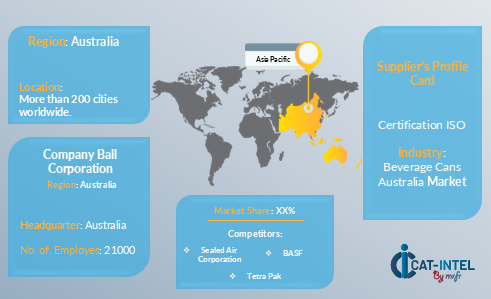
Key Development: Procurement Category significant development
Procurement Category |
Significant Development |
Impact |
Aluminum Supply |
Increased demand for sustainable aluminum sourcing |
Focus on recycled aluminum and eco-friendly practices to reduce carbon footprint and supply chain costs. |
Packaging Innovations |
Advancement in lightweight cans and easy-open tabs |
Reduced packaging costs and improved consumer convenience, enhancing market appeal. |
Coatings & Printing |
Introduction of environmentally friendly coatings |
Improved sustainability of cans, addressing consumer demand for eco-conscious packaging. |
Logistics & Transportation |
Optimization of logistics with a focus on reducing carbon emissions |
Enhanced supply chain efficiency, leading to lower transportation costs and improved environmental footprint. |
Automation & Technology |
Increased use of robotics and automation in production |
Reduced labor costs and improved production efficiency, leading to cost savings and higher output rates. |
Recycling & Waste Management |
Greater emphasis on can recycling and circular economy models |
Support for sustainable practices and reduced raw material costs, along with compliance with environmental regulations. |
Raw Material Sourcing |
Strengthened supplier relationships for long-term contracts |
Stabilized raw material pricing and ensured reliable supply of aluminum for can production. |
Supplier Diversity |
Increased focus on sourcing from diverse, ethical, and local suppliers |
Enhanced corporate social responsibility (CSR), supporting local businesses while mitigating supply chain risks. |
Procurement Attribute/Metric |
Details |
Market Sizing |
The Australian beverage can market is projected to grow from USD XX billion in 2023 to USD YY billion by 2032, with a CAGR of 3.09% during the forecast period. |
Adoption of Canned Beverages |
Growing demand for beer, especially craft beer, and other canned beverages. Increasing trend toward eco-friendly packaging and aluminum can usage. |
Top Strategies for 2024 |
Expanding product variety with limited edition designs, focusing on eco-friendly practices (increased use of aluminum), and forming collaborations with entertainment brands. |
Automation in Canning |
Over 50% of Australian canning facilities are adopting high-speed automated filling and packaging systems to improve efficiency and reduce costs. |
Procurement Challenges |
Fluctuating aluminum prices, supply chain disruptions, and pressure to adopt more sustainable packaging solutions. |
Key Suppliers |
Orora Packaging Australia, Pro Canning, Visy Group – major players providing various can sizes and emphasizing sustainable packaging. |
Key Regions Covered |
Major markets in New South Wales, Victoria, Queensland, and Western Australia, particularly in urban centers. |
Market Drivers and Trends |
Increasing beer consumption, the rise of craft beer, and demand for sustainable packaging. The trend of using aluminum for recyclability is growing. |










